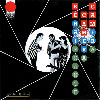RENAISSANCE : CAMERA CAMERA
- Camera Camera
- Faeries (Living at the Bottom of the Garden)
- Rememeber
- Bonjour Swansong
- Tyrant-Tula
- Okichi-San
- Jigsaw
- Running Away From You
- Ukraine Ways
Label : Repertoire Records
Release Year : 1981
Length : 45:25
Review (AllMusic) : Renaissance's Camera Camera is one of the all-time "Who do they think they're fooling?" albums. Released in 1981 on former manager Miles Copeland's unassailably hip label IRS Records, Camera Camera features suavely cool graphics on the cover (along with singer Annie Haslam in a flirty, kicky pose) and brightly colored clothes on the slimmed-down lineup. Seriously, have a gander at these clothes if you ever see a copy of this album: the old phrase "mutton dressed as lamb" does not even begin to describe the sight of the formerly sedate and certainly old-enough-to-know-better Michael Dunford and Jon Camp in patchwork pastels and black and white vertical stripes, respectively, and although Haslam is gorgeous enough to almost make it work, even she can't pull off that hair, not to mention the ghastly nameplate necklace. So anyway, the whole idea is to make believe that Renaissance is a quirky new wave trio (hired hand keyboardist Peter Gosling and drummer Peter Barron aren't pictured, possibly because there wasn't enough of a wardrobe budget for them) and not the progressive rock mainstays they had been since 1972's Prologue. Again, who do they think they're fooling? Now comes the hard-to-believe part: Camera Camera is actually a surprisingly good record. 1979's Azure d'Or had been a transitional attempt at reinvention, and it was a bit of a botch. After Haslam and Dunford took some time off to work with Gosling under the new band name Nevada (releasing two singles in 1980), that trio reformed with Camp as Renaissance and committed fully to a transformation in their sound. Wisely, Renaissance aren't trying for the Spandau Ballet/Duran Duran side of the new wave market - they weren't stupid enough to think they could get away with that - but the artier feel of Peter Gabriel's third solo album and, most crucially, Kate Bush's melding of new wave and art rock. The combination of Gosling's piano and synthesizers with Haslam's operatically-trained vocals sounds so close to Bush's The Kick Inside era that one can only assume that this was the intention. Haslam even sticks primarily to the upper end of her impressive range, cementing the similarity to Bush's bracing soprano. Although there are a couple of misfires, particularly "Jigsaw," which takes an unfortunate feint towards rocking out (never this band's forte), most of these nine songs are entirely successful blends of flashy new wave and the group's traditional sound. In particular, the Camp-penned "Running Away From You" is the most successful attempt at a straightforward pop song the band ever managed, and the multi-part title track and the playful "Faeries (Living at the Bottom of the Garden)" are every bit the equal of some of Renaissance's best earlier work. Best of all, the production (by the band) does not sound nearly as dated as many similar albums from its time, largely due to the avoidance of electronic drums and the fairly restrained use of synthesizers. Hardcore prog fans might still find Camera Camera a treasonous sellout, but after all, Renaissance had already completely transformed itself once before, from the folky Yardbirds offshoot of its earliest incarnation, to the almost entirely different lineup that recorded the classical rock of Prologue. Why couldn't they do it again?
